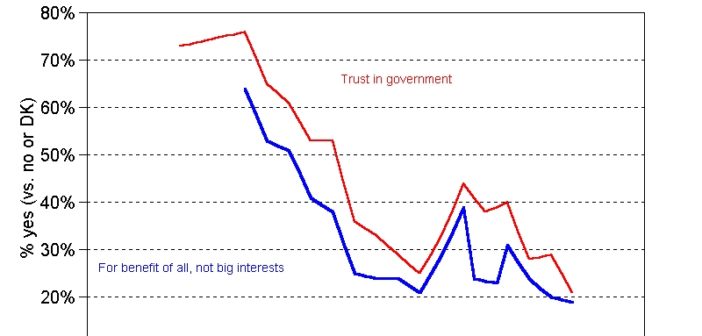By: Rhiannon Flanagan
More of America’s population has become accustomed to the idea of government conspiracies. Often the “Illuminati” logo is placed in pop culture references, and more and more people on social media sites agree with the idea of the moon landing as a produced event. Most notably, older aged individuals bring doubts about government activity from decades of social upheaval and progressive movements. Nevertheless, trust in the government goes beyond the bounds of imaginative ideas and existential crisis. Presently, trust is based upon social acceptance in large-scale numbers or rather a consensus surrounding patriotism and popularity in opinion.
The construct of government truths has come through social media and through years of history in radio, television and journalism. Considering the amount of control other individuals have over what information gets out, it seems plausible for many citizens to have a hint of doubt, because they doubt human beings that are much like themselves and less like the robotic devices they are overpowered by.
Nevertheless, the extremes to which individuals form and believe weak notions of reptilian presidents and a flat earth are based off of quickly fed fallacies from social media and the modern-day version of television, YouTube. Consequently, one might add that the large sum of conspirators and believers who watch YouTube are teens and young adults, yet there are still a great number of distrusting citizens who are well aged. Furthermore, a popular website for articles, polls and quizzes among millennials and Generation Z, is “Buzzfeed” who provides results for a poll on popular conspiracies. The quiz format bears the title “Let’s Settle Which Conspiracy Theories Are True Once And For All,” and includes results showing that 77 percent of individuals who participated believe that the government is hiding aliens, while 72 percent think the Illuminati could be real, followed by the 95 percent of individuals who think “the moon itself could be fake.”
Ultimately, one might consider teenagers to be at fault for the drastic increase in conspiracy believers; however, social media is the culprit. Social media and the abundance of information available to global communities allows for confusion, miscommunication and misinterpretation that strengthens conspiracies. Although the mass amount of information can include new research and answers to questions, the popularity in biased opinion shifts facts or figures into extreme conclusions which end up with resulting attitudes that dismantle trust.
Nevertheless, young adults are more accustomed to applications and websites, but middle-aged and older adults are just as guilty for falling into media traps. For example, it is a fact the much of the middle class and older citizens make up a large sum of the voting population. So, by the momentum of the Trump and Hillary campaigns, the older population was subject to become believers in theories about significant deleted emails and Russian interference, but neither instances have been proven. However, mass information and theories regarding both of the circumstances have been current topics in media and have even caused destructive behaviors of the general public. Besides, politics throughout centuries have arguably always been the main area of development for distrust and people often play into conspiracies because like any argument; it is easier to fall victim to opinion, especially with somewhat logical threads to follow.
Withal, conspiracies revolve around personal values and opinions which are shaped and adapted to the information or examples granted to us. Significantly, sources suggest that conspiracies may have to do even more with personal characteristics than we think. For example, livescience.com analyzes survey results regarding percentages of mostly over half in support of popular conspiracy theories. The explanation details underlying causes in relation to already existing personality traits “people who believe conspiracy theories tended to be more pessimistic, less trusting of people they know.”
Alternatively, YouGov.com gives results for conspiracies regarding the recent presidential campaign and election, wherein opinions upon the candidates differed greatly when asked the same question. Subsequently, results such as the tie between Clinton supporters who believed that Russia had or had not “tampered vote tallies to help Donald Trump.” Intrinsically, the split votes were equal, hence the idea that there are many factors and personality distinctions that make one more or less likely to agree with conspiracies. Moreover, the site states in discretion, “Candidate preference seems to mean more than age, education and political interest when it comes to which of these conspiracies someone is likely to believe. Overall, the causes of distrust become the unsolved argument nature vs. nurture.
Conspiracy theories are not the only cause and answer to support government distrust. More importantly, there are viable reasons to distrust the government due to real occurrences. For instance, the: MKULTRA experiments, Watergate scandal, plutonium injections in the Manhattan project, Alcohol poisonings during prohibition, treatment of Japanese Americans in internment camps and the list goes on.
Accordingly exemplified, some conspiracies posed by the public and journalists have proved to be true in the past, so it is easy to see why there is still such a strong presence of distrust in the government. Fundamentally, Reader’s Digest reveals a list of government assumptions that proved to be true, like the belief that the government was stealing dead bodies for radioactive testing as a part of “project sunshine.” Consequently, this came with the reveal of “a worldwide network of agents to find recently deceased babies and children, and then take samples and even limbs—each collected without notification or permission of the more than 1,500 grieving families.”
Resolutely, the notion of public outrage and continuous distrust only seems plausible as a major outlook for American society, but the pre-existing presence of public hysteria and extremist opinions is just as impactful in creating the idea that it is necessary to distrust the government. In other words, confidential information is at times unknown to the public to prevent chaos as well as global conflicts.
In fairness, the public does have a right to know the plans of its leaders, yet with due justice, citizens should have trust in the legislatures created to balance decision making. Also, considering the first amendment’s details, citizens still have the right to speak freely and assemble to have their voices heard, although, there have been instances in which the government has not abided by the laws of the constitution. Regardless, as Americans, we cannot only confide in conspiracies and social media, despite the entertainment they provide in pop culture.
Conclusively, if we choose not to trust our government, then who can we really trust?





